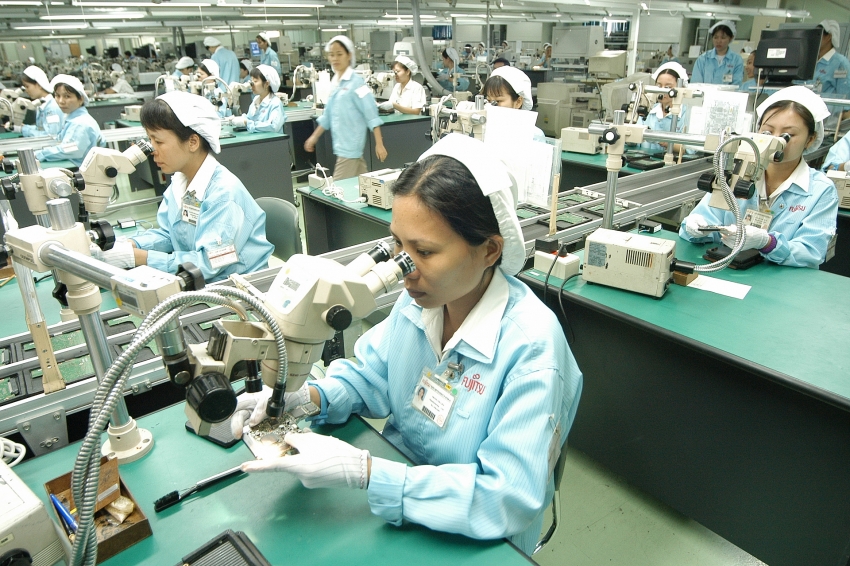Supply chain is heading to Vietnam
Data from the US Census Bureau show a 35.6 per cent surge in goods imports from Vietnam last year, compared with a 16.2 per cent contraction in goods imported from China.
"Data for this year will be distorted by the effects of the coronavirus on global supply chains, but the trend of manufacturing moving from China to Southeast Asia will continue," said Stuart Ross, head of industrial for Southeast Asia at JLL.
 |
| Vietnamese manufacturing companies will play a more important role in the global supply chain. Photo Le Toan |
Meanwhile, Stephen Wyatt, country head of JLL Vietnam said that Vietnam remains a promising market with a growing trend of manufacturing companies looking to set up operations in the country, which has been happening for a number of years.
“Industrial park developers remain confident that demand for industrial land will continue to grow and therefore land prices are expected to increase in line with the long-term potential of Vietnam’s industrial segment," explains Wyatt.
Vietnam has attracted the majority of those who wanted to diversify their manufacturing portfolio outside China, thanks to its relatively developed infrastructure and proximity to China.
The average land price in the northern areas reached $99 per square metre per lease term, up 6.5 per cent on-year in the first quarter of 2020, while the southern areas recorded $101 per sq.m per lease term, up 12.2 per cent on-year in the last quarter of 2019.
Ready-built factories recorded in the southern provinces have an average price of $3.5-5.0 per sq.m per month, a slight increase in Binh Duong, Ho Chi Minh City, and Long An, and remain stable in the rest of the provinces.
In light of the current COVID-19 situation, the postponement of ongoing leasing negotiations and new requirements will become more apparent if the situation does not improve soon.
However, JLL believes that the market is likely to recover and grow rapidly after the epidemic is well under control.
The disruption in the global supply chain caused by the virus outbreak is urging businesses to diversify their manufacturing portfolios geographically, instead of being overly reliant on one market.
Meanwhile, China is committed to growing high-value industries. As a leading manufacturer of solar panels, 5G networks, AI, and batteries, these industries are generally more favoured by local authorities. Lower-value manufacturing chains are often seen as adding to environmental pollution. As China moves towards becoming more eco-friendly, a cleaner, less space-intensive manufacturing sector will also free up land for rezoning to convert to residential spaces.
"Not all manufacturing can be easily outsourced to Vietnam. Manufacturing wages in China are now more than three times those in Vietnam, but skilled labour in China is also higher. The sheer scale of China cannot be replicated: there are more migrant industrial workers in China than people in Vietnam. Furthermore, a large percentage of China’s manufacturing is to serve the domestic market," Stephen added.
According to JLL, many businesses are likely to rethink their supply chains in the long term to ensure the continuity of their operations and mitigate risks of future shocks. Coupled with initiatives to improve the sustainability performance and limit the environmental impact of wider operations, retailers may opt to produce and house more stock locally.
With COVID-19 and trade tensions driving the shift of production lines from China to Southeast Asia, Vietnam, in particular, seems to have emerged as an attractive destination for investors and manufacturers alike.
What the stars mean:
★ Poor ★ ★ Promising ★★★ Good ★★★★ Very good ★★★★★ Exceptional
 Tag:
Tag:
Related Contents
Latest News
More News
- Hermes joins Long Thanh cargo terminal development (February 04, 2026 | 15:59)
- SCG enhances production and distribution in Vietnam (February 04, 2026 | 08:00)
- UNIVACCO strengthens Asia expansion with Vietnam facility (February 03, 2026 | 08:00)
- Cai Mep Ha Port project wins approval with $1.95bn investment (February 02, 2026 | 16:17)
- Repositioning Vietnam in Asia’s manufacturing race (February 02, 2026 | 16:00)
- Manufacturing growth remains solid in early 2026 (February 02, 2026 | 15:28)
- Navigating venture capital trends across the continent (February 02, 2026 | 14:00)
- Motivations to achieve high growth (February 02, 2026 | 11:00)
- Capacity and regulations among British areas of expertise in IFCs (February 02, 2026 | 09:09)
- Transition underway in German investment across Vietnam (February 02, 2026 | 08:00)

























 Mobile Version
Mobile Version